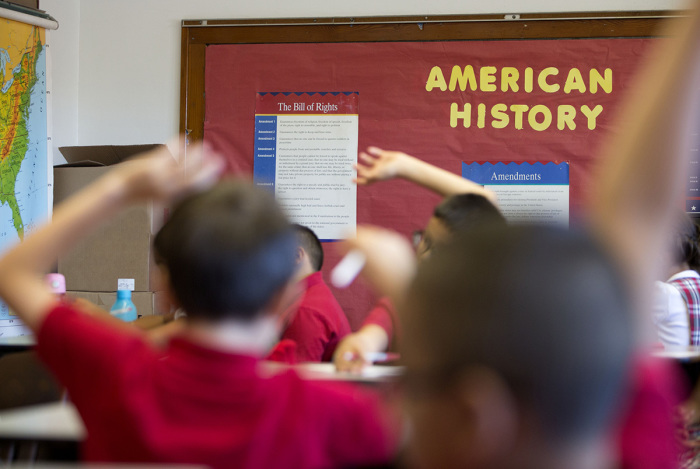Success in school more favorable for students who live with married, biological parents: study

While society has increasingly embraced alternative families like single-parent homes and stepfamilies, a new Institute for Family Studies research brief suggests students who live with their married biological parents perform better in school.
The brief, written by Nicholas Zill, a research psychologist and IFS senior fellow, and Brad Wilcox, director of the National Marriage Project at the University of Virginia and a fellow at The Future of Freedom at IFS, was based on data from the 1996 and 2019 National Household Education Surveys.
These surveys were completed by parents whose children were enrolled in elementary and secondary schools nationwide. The 1996 survey covered 17,535 students in kindergarten through the 12th grade, while the 2019 survey covered 15,990 students in the same age range.
In their analysis, Zill and Wilcox looked at the frequency of teacher and school interventions for students from both non-traditional and traditional families. They examined whether or not the child repeated one or more grades, if the child was suspended or expelled, the frequency with which schools contacted parents about their child’s schoolwork and how often parents were contacted about the child’s behavior.
The researchers found that the overall frequency of school interventions fell from 1996 to 2019.
In 1996, parents of 21.9% of students were contacted about their child’s schoolwork. By 2019, this share fell to 17.4%. Over the same period, the percentage of parents contacted about their child’s behavior dropped from 27% in 1996 to 21.6% in 2019. The share of children who repeated a grade fell from 12.9% in 1996 to 6% in 2019. The share of children suspended or expelled also decreased from 18.8% to 9.4%.
Despite the overall decrease in the frequency of school interventions from 1996 to 2019, the odds of school interventions increased for students in non-traditional families on all measures. However, the increased risk was only considered statistically significant for suspensions and parental contact about student behavior.
“It is only for suspension and parental contact about behavioral problems that the increases were statistically significant,” the researchers wrote. “But it is striking that the odds ratio increased for all four outcomes in the last quarter-century. Our results are consistent with the theory that marriage matters more than ever for today’s children.”
When the data were adjusted to control for differences across family types in racial composition and parent education levels, as well as for the ages and sexes of the students in each group, the researchers found that the greater risks of school intervention faced by students from non-traditional families declined.
Still, according to Zill and Wilcox, “students from non-intact families continue to have nearly triple the risk of suspension and double the risk of grade repetition as students from intact, biological families.” Specifically, students who grow up in non-traditional families are 2.92 times more likely than their peers in intact families to get suspended from school while those who live in non-traditional families are 2.01 times more likely to end up repeating a grade than children from intact families.
Parents of students growing up in non-traditional households are 2.18 times more likely than parents of students raised by a nuclear family to have schools contact them about their children’s behavior. At the same time, parents of students living in a non-traditional household were just 1.63 times more likely than parents of children from two-parent homes to have schools contact them about their children’s schoolwork.
“Despite the declines in the frequency of school interventions for students from single-parent, stepparent, and other non-intact family types, in both surveys, these students were significantly more likely than those from married, biological families to receive each of these interventions,” the researchers explained. “And the over-time declines in the frequencies of school interventions were greater for students from married, biological families. So, the relative risk faced by students from non-traditional families has actually increased or remained the same.”
The researchers clarified in their brief that their findings should not be interpreted as saying students from non-traditional families cannot succeed in school, only that the odds of academic success are “more favorable” for students from traditional ones.
“These results reaffirm the conclusion that children from stable, married families have a better chance of receiving the guidance and support they need to succeed academically and adapt confidently to the classroom environment than children from disrupted or reconstituted families,” they noted. “This does not mean that children from non-traditional families cannot do well in school. Many do, despite the conflict, turmoil, or curtailed parenting they may experience at home.”




























